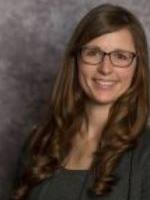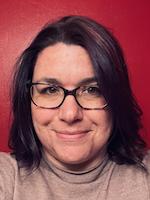Presenters
My career started in Houston where I taught middle school math. Thereafter, I taught middle school computer science with Manassas Park for four years. I have been with CodeVA writing curriculum for two years. I enjoy hiking, going to the beach, reading and hanging out with my family.
Michelle Pealo has been working on curriculum with CodeVA for about a year, and has been teaching at the elementary school level for 18 years. She currently teaches foundational computer science concepts to students in Pre-K through 3rd grade in a public school in southeastern Virginia. Her favorite parts of teaching computer science are encouraging kids to control technology instead of consuming it and helping students notice the relationships between CS concepts and more familiar reading, math, science, and social studies concepts. When she isn't tinkering with programs and robots, she "unplugs" by engaging in a good book or a knitting project.
Instructional Design Lead
Jasper Gunn works as a curriculum lead at CodeVA, a Virginia CS ed nonprofit, where they have developed computer science curriculum across grade levels, supported professional learning, and taught out-of-school time experiences. They are also a ‘22-23 CSTA Equity Fellow. Before joining CodeVA full-time, Jasper taught for 5+ years at preschool and K-8 levels at a Reggio-Emelia inspired school, where they learned the importance of wonder, play, and exploration in supporting the growth of the whole child. Jasper graduated from the University of Richmond with a B.S. in Interdisciplinary Studies: Critical Technology Studies.
Session description
Expand students’ vision of who can be a computer scientist while supporting the whole child. Through diverse representation in children’s literature and integration of social-emotional learning (SEL) skills, we can teach equitable, integrated, culturally relevant computer science that is engaging and creative using Scratch. Includes free, Creative Commons lesson sequences about identity.
Purpose & objective
Participants will learn the connection between diverse representation and social-emotional learning with recruiting and retaining diverse students into CS disciplines, supporting CS4All and patching the “Leaky Tech Pipeline” (Kapor Center)
Participants will discuss methods of supporting the social-emotional wellbeing of their students in computer science classrooms
Participants will receive and engage with integrated CS lessons that are culturally responsive and aligned to CS, ELA, and SEL standards
More [+]
Outline
10 min: How social-emotional learning creates resilient students of all backgrounds, helping students feel they belong (lecture)
15 min: Weaving SEL into CS & Core content integrated lessons (lesson showcase, possible read-aloud)
10 min: A deeper dive into CS learning: Code tracing an example project in Scratch (group code tracing)
10 min: SEL education resource swap– what techniques do you use to support SEL and DEIB in your context? What external resources do you recommend? (audience participation, verbally and on collective document)
15 min: Q&A
More [+]
Supporting research
The Kapor Center for Social Impact, Culturally Responsive-Sustaining CS Education: A Framework https://www.kaporcenter.org/wp-content/uploads/2021/06/1_CRCSFramework-Report_v7_for-web-redesign-.pdf
Scott, A., et al. (2018). “The Leaky Tech Pipeline: A Comprehensive Framework for Understanding and Addressing the Lack of Diversity across the Tech Ecosystem.” Kapor Center for Social Impact. https://www.kaporcenter.org/the-leaky-tech-pipeline-a-comprehensive-framework-for-understanding-and-addressing-the-lack-of-diversity-across-the-tech-ecosystem/
More [+]



